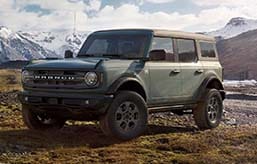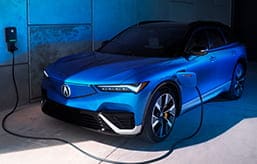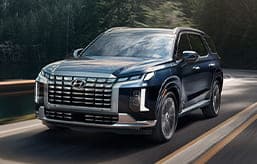- An equivalent Tacoma is roughly $10,000 less than the Land Cruiser.
- Toyota doesn’t (yet) sell a Land Cruiser on proper all-terrain tires.
- Looking at ground clearance and approach/departure angles, the Tacoma rules.
Toyota Tacoma vs. Land Cruiser: Why We Like the Pickup Better Off-Road
After a weekend of off-roading, we prefer Toyota's midsize Tacoma to the new Land Cruiser SUV
Trucks are not always the answer. They can be expensive, and for most folks, a sealed cargo area is more useful than an open bed. But after a weekend off-roading with Toyota in multiple variants of the new Land Cruiser and Tacoma, we're leaning toward the pickup truck over the SUV.
Off-road ops
Despite its moniker carrying an off-road legacy dating back more than seven decades, the current J250 Land Cruiser is exclusively offered with on-road-oriented tires at launch. We drove all three variants — the base 1958, standard Land Cruiser and 2024-only First Edition. The standard and 1958 variants ride on all-season tires, but the First Edition gets a Michelin LTX Trail tire, which the company's website says delivers “light all-terrain performance.”
In the case of the Tacoma, there are three off-road-ready trim levels — the TRD Off-Road, Trailhunter and TRD Pro — all of which get properly nubby all-terrains. The former wears BFGoodrich Trail-Terrains and the latter pair roll on Goodyear Wrangler Territory rubbers. Tire diameter is relatively consistent across both vehicles. The more affordable trims’ (1958 and TRD Off-Road) tires measure 31.5 to 31.6 inches, and pricier models get 32.5- to 32.6-inch rubber.
Dedicated all-terrain tires provide superior puncture resistance and better traction off-road than all-season alternatives, usually at the expense of efficiency. (Comparing the Land Cruiser to the Tacoma TRD Pro, both are rated at 23 mpg combined.) We’ll note that after airing the tires down, neither vehicle struggled much for traction on the trails we drove through Colorado, but the limits of the all-terrains are certainly higher. Both the Tacoma and Land Cruiser have similar levels of tire noise on the highway.
Second, the Tacoma has a pair of variants with killer off-road dampers. The Trailhunter gets Old Man Emu shocks and the TRD Pro gets a manually adjustable set from Fox. In both trucks, we noticed impressive small-impact absorption around 15 mph and the pickups came alive over bigger bumps around 25 mph. No Land Cruiser has similar shock travel or performance.
The Tacoma has more ground clearance too. Among the Tacoma's off-road trims, clearance ranges from 11 inches to 11.3 inches, but the most you can get from a stock Land Cruiser at launch is 8 inches. You’ll also get superior approach, breakover and departure angles with the truck: 35.7/27.4/22.6 degrees with the Tacoma compared to the Land Cruiser’s 32.0/23.0/22.0 degrees. The Tacoma’s one downfall? The Land Cruiser's much shorter wheelbase makes it more maneuverable, both on the trail and around town.
Toyota Tacoma vs. Land Cruiser Off-Road
Tacoma TRD Pro | Land Cruiser | |
|---|---|---|
| Ground clearance | 11.5 inches | 8.0 inches |
| Approach angle | 35.7 degrees | 32.0 degrees |
| Breakover angle | 27.4 degrees | 23.0 degrees |
| Departure angle | 22.6 degrees | 22.0 degrees |
| Wheelbase | 131.9 inches | 112.2 inches |
The Tacoma’s higher ceiling of factory off-road offerings means you can get a few awesome accessories too. You can order a Tacoma with steel bumpers, a snorkel intake that spits rad turbo noises into the cabin through the front passenger window, and bright red ARB tow hooks.
We’re all but certain Toyota will add to the Land Cruiser in the coming years, and we sincerely look forward to the more capable SUV variants we can only assume are in the works. For now, though, the Tacoma is the better pick for the trails.
Interior and pricing
We mostly like the Tacoma's interior better, too. Toyota’s small pickup has big, ergonomic knobs for controlling the cabin temperature, volume and transfer case. In the Land Cruiser, you get a little toggle switch for selecting low-range four-wheel drive and small dials for the volume and drive modes. We like an interface you can easily navigate while wearing bulky gloves, plus the Tacoma’s cabin just plain looks tougher.
We do have one major knock against the truck’s interior, however. The TRD Pro has what Toyota calls IsoDynamic sport seats up front, which employ four adjustable shocks built into the seatbacks in an effort to improve comfort and minimize head bobble. They look very cool. In our experience, though, while the seats are supportive and well padded, we noticed little difference in head toss between the TRD’s shock-absorbed thrones and the regular chairs in the Trailhunter. Considering the IsoDynamic feature severely encroaches on usable rear legroom, we struggle to see the appeal.
Seats aside, we’re impressed that, in addition to the Tacoma’s preferable interior, more robust hardware, and better geometry, it’s also significantly more affordable. A Tacoma TRD Off-Road with an automatic transmission, front skid plate and i-Force Max hybrid engine starts at $48,655, while the cheapest Land Cruiser 1958 with the same engine will set you back $57,400. For that cash, you could add the Tacoma TRD Off-Road’s $8,450 Premium package with heated and ventilated synthetic leather seats, a huge infotainment screen, premium audio system and a whole lot more. The 1958 doesn’t even have padded armrests.
Of note, the Tacoma is also available with the standard turbo-four powertrain. In our testing, an even more affordable non-hybrid Tacoma is actually more than half a second quicker to 60 mph than an i-Force Max Land Cruiser, and the combined fuel economy benefit of the hybrid is just 2 mpg.
Tacoma > Land Cruiser (for now)
Don’t take this to mean we don’t like the Land Cruiser. The style, on-road composure and impressive if imperfect off-road capability make the latest iteration of this legend a terrific option for those who want the vibe (and most of the trail performance) of a Wrangler or Bronco without the everyday setbacks.
Still, the Tacoma’s superior off-road readiness, much more accessible price point and better-looking, more functional interior mean that, if we were spending our money on a stock Toyota, we'd buy the truck. At least that’s what we’re sticking with until Toyota reveals the inevitable Land Cruiser TRD/Trailhunter/Canyonero Edition.










 by
by  edited by
edited by